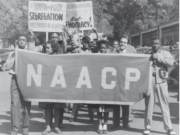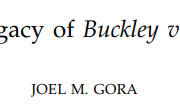In this article, election law attorney Robert Bauer, analyzes regulation of political speech that attempts to capture the “appearance of corruption.”
According to Bauer, “the appearance of corruption may rest on the various effects of money in politics in the aggregate — on perceived corruption defined as the threat to ‘electoral integrity’ that arises from frenzied fundraising and unlimited spending. The corruption in question attacks the electoral process; it does not consist exclusively of debts incurred to campaign donors and spenders who expect post-election repayment. One might even consider whether the references to the “appearance” of corruption have become the means, not explicitly recognized, by which these other concerns with money in electoral politics have come to be expressed.”
Bauer explains that “the coherence of contemporary jurisprudence has suffered from the Court’s validation of an “appearance” basis for regulation — the potential for “disastrous” citizen disengagement — at the same time that its consideration of appearance issues focuses only on quid pro quo governmental corruption. Of course, even if the Court acknowledged this electorally centered source of untoward appearances, it would not likely conclude that legislatures have the latitude, on this ground, to regulate electoral processes. Its decision in Randall v. Sorrell speaks to this point.” Bauer notes that “it is nonetheless useful to consider the gap between the appearance problem that the Court will weigh in the constitutional balance and those questions of appearance that animate much campaign finance debate and controversy.”
Read the full article by noted election attorney Robert Bauer here.














